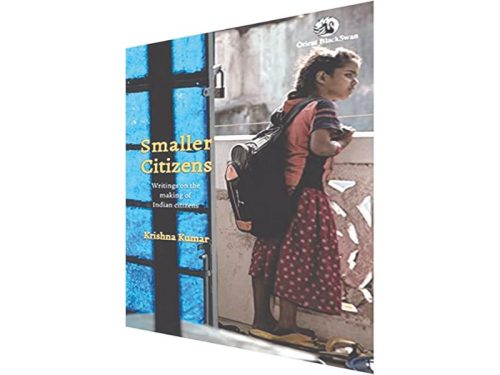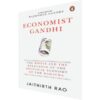Clarion call for educators
SMALLER CITIZENS: WRITINGS ON THE MAKING OF INDIAN CITIZENS
Krishna Kumar
ORIENT BLACKSWAN
Rs.395 Pages 149
The author’s insights help to locate the child within socio-political complexities while understanding education in India and its intersection with citizenship
KRISHNA Kumar’s deep and critical engagement with education and its impact on the child is clearly reflected in this slim volume of 18 collected essays, Smaller Citizens: Writings on the Making of Indian Citizens. Collating these essays in a single volume signifies the common theme that binds them together.
The author — a highly respected former professor of education at Delhi University — explores with a critical lens, themes of education and citizenship, marginalised childhoods and schooling. He examines policy documents that focus on flexibility and contextualisation of curricula, standards, assessment as well as the manner in which discriminatory practices define Indian education, and how educationists and practitioners merely pay lip service to far-sighted policy documents.
With a fine pencil, Kumar highlights systemic bias that makes institutions resistant to change. The insights developed help the reader in locating the child within socio-political complexities while understanding education in India and its intersection with citizenship.
The year of publication of the book (2021) is significant from two perspectives. First, this is a period post the two tumultuous waves of the pandemic that has made pursuing life and education difficult for young citizens of India. Existing disparities have deepened as a large section of children have been pushed out of formal education. Many of them have been forced into labour and/or child marriage while others have become rudderless after the loss of family and livelihood. The pandemic has again highlighted the disparities that have always existed in Indian society. The essays throw light on the limitations and biases that are a hallmark of our society.
Second, this is also the period when the process of translating the National Education Policy (NEP) 2020 into reality has been initiated. This is a policy document that visualises massive reform of Indian education, bringing pre-primary to higher education within its ambit. In this context, the insights built through a perusal of the essays equip the reader with the critical ability to review NEP 2020 from diverse perspectives.
The prologue sets the tone of the book as the writer explores major paradoxes that lie at the heart of modern education — on the one hand, encouraging the young to think freely and apply their critical faculties to contemporary problems while on the other, educational practices train them to become loyal citizens, obeying authorities representative of the state.
The Right of Children to Free and Compulsory Education (RTE) Act, 2009 and its narrow interpretation, is the focal point of some of the essays included in this compendium. The Act’s potential to reform elementary education making it more equitable through access, has been implemented. Yet another dimension to the legislation is acceptance of the child’s agency and the need for teachers to appreciate and translate it in actuality remains an unfulfilled goal.
The author goes on to explore incidents from school classrooms across the country, looking at diverse social contexts to highlight how children are treated. The critique brings out yet another paradox latent in education: education is supposed to make conflicts bearable yet in reality, it serves as a source of conflict through systemic biases that ail Indian society. Biases and disparities based on gender, caste, religious divides are deeply entrenched in our society impacting educational systems and processes, eroding the landscape of teaching and learning.
The author’s commentary on the status of teachers is evident in the statement “…India has treated its teachers like messengers” — messengers who need not understand the message they deliver in classrooms. The label of messenger is deeply telling, for it accounts absence of the voice of teacher practitioners in most high-level committees that are constituted to reform education. If present, they are so few in number that their voice carries no weight.
On the issue of gender, the author’s succinct analysis illuminates problems associated with girls’ education. The issue is not merely of access, but also of the nature and quality of girls’ educational experience. Non-discrimination between boys and girls means overlooking lives led at home and the reality of the girl child’s daily experience of negotiating the distance between home and school.
Kumar cites Leela Dube’s use of the term ‘inescapability’ to describe the inevitability of a girl’s future and how it impinges on her education — desire to be educated coupled with the determination to pursue it. He cites examples from outside and inside school classrooms to explain the tragic implications of gendering that a young girl faces. Such examples are peppered throughout the text. Some of them are noteworthy and stand out for the social harshness they portray. Incidents related to a headmistress refusing admission to girl students because they are child brides, and of four adolescent girls jumping into a well because they had been scolded by their teacher for poor academic performance. These incidents are deeply evocative of the bleak reality of being caste/cast as a woman in the Indian context.
The author also turns his attention to peace and the need for children to experience it in their daily lives at school. Since the early 20th century, peace education programmes around the world have represented a spectrum of themes, including nuclearism, environmental responsibility, international understanding, non-violence, conflict resolution, democracy, tolerance of diversity and coexistence. In the context of India’s freedom struggle, its psychological dimensions and Gandhi’s interpretation of it, peace education acquires a wider and deeper connotation.
Schools and colleges socialise the young to either fear the world or ignore it for in Kumar’s words, “that education which allows us to stay indifferent to violence and war is no education at all”. On the contrary, peace and non-violence should be core components of school curriculums for children to understand and engage with it critically.
Indeed, no debate, no conflict in education is too insignificant to escape the attention of Prof. Kumar’s critical lens. These short illuminating analyses examine the deep fissures inherent in Indian education and society — the death of Gandhi’s Basic Education, the duality of Nehru’s India, urban-rural polarity, Kerala’s progress in literacy but its lack of pedagogic modernism, are adroitly brought out.
Smaller Citizens: Writings on the Making of Indian Citizens is a clarion call for all engaged with education and welfare of the child. Let’s take charge of changing the direction and content of education.
VEENA KAPOOR (The Book Review)
















Add comment